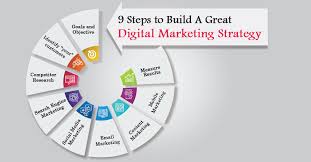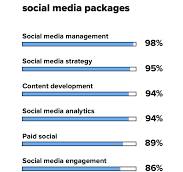Social Marketing: Engaging Audiences for Positive Change
Social marketing is a powerful strategy that goes beyond traditional marketing techniques to promote social good and behavior change. It involves applying marketing principles and techniques to influence attitudes, behaviors, and perceptions in order to benefit society as a whole.
Key Components of Social Marketing
Effective social marketing campaigns typically involve the following key components:
- Research: Understanding the target audience, their behaviors, motivations, and barriers is crucial for developing impactful campaigns.
- Segmentation: Dividing the target audience into segments based on characteristics such as demographics, psychographics, and behaviors helps tailor messages for maximum impact.
- Behavior Change Theory: Utilizing theories of behavior change, such as the Transtheoretical Model or Social Cognitive Theory, to inform campaign strategies and interventions.
- Message Development: Crafting compelling messages that resonate with the target audience and drive desired behavioral outcomes.
- Channels: Choosing the right communication channels (e.g., social media, traditional media, community events) to reach and engage the target audience effectively.
- Evaluation: Monitoring and evaluating campaign effectiveness through metrics such as reach, engagement, behavior change, and social impact.
Examples of Successful Social Marketing Campaigns
Several organizations have implemented impactful social marketing campaigns that have brought about positive change in various areas. For instance:
- The Truth Initiative’s “Truth” Campaign: This anti-smoking campaign targeted young people with hard-hitting messages about the dangers of smoking. It successfully reduced smoking rates among teens.
- #LikeAGirl Campaign by Always: This campaign challenged gender stereotypes by empowering girls to redefine what it means to do things “like a girl.” It sparked conversations about gender equality.
- The American Heart Association’s “Go Red for Women” Campaign: This campaign raised awareness about heart disease in women and encouraged them to take control of their heart health. It led to increased awareness and preventive actions among women.
The Impact of Social Marketing
Social marketing has the potential to drive significant change by influencing behaviors, attitudes, policies, and social norms. Whether addressing public health issues, environmental concerns, or social justice causes, effective social marketing can inspire action and create lasting impact in communities around the world.
7 Key Advantages of Social Marketing: Driving Positive Change and Engagement
- 1. Promotes positive social change and behavior modification.
- 2. Engages target audiences effectively through tailored messages.
- 3. Utilizes research and data-driven strategies for maximum impact.
- 4. Raises awareness about important social issues and causes.
- 5. Encourages community involvement and collective action.
- 6. Fosters long-term relationships with stakeholders and supporters.
- 7. Measures success through tangible metrics and evaluation methods.
Challenges of Social Marketing: High Costs, Time Demands, Limited Reach, and Behavior Change Hurdles
1. Promotes positive social change and behavior modification.
Social marketing marketing plays a crucial role in promoting positive social change and behavior modification. By utilizing strategic messaging and targeted campaigns, social marketing initiatives aim to influence attitudes and behaviors for the betterment of society. Whether addressing public health issues, environmental sustainability, or social justice causes, social marketing has the power to raise awareness, educate communities, and inspire individuals to adopt healthier habits and make informed choices. Through its focus on driving positive behavior change, social marketing contributes to creating a more equitable and sustainable world for all.
2. Engages target audiences effectively through tailored messages.
One of the key advantages of social marketing is its ability to engage target audiences effectively through tailored messages. By conducting thorough research and segmentation, social marketers can craft messages that resonate with specific audience segments, addressing their unique needs, motivations, and barriers. This personalized approach increases the likelihood of capturing the audience’s attention, fostering meaningful connections, and ultimately driving desired behavioral outcomes. Tailored messages not only enhance audience engagement but also contribute to the overall effectiveness and success of social marketing campaigns in bringing about positive change.
3. Utilizes research and data-driven strategies for maximum impact.
Social marketing excels in utilizing research and data-driven strategies to achieve maximum impact. By conducting thorough research on target audiences, their behaviors, preferences, and barriers, social marketers can tailor their campaigns effectively. This approach allows for the development of evidence-based interventions that are more likely to resonate with the intended audience and drive desired behavioral outcomes. By analyzing data and metrics throughout the campaign, social marketers can continuously refine their strategies for greater effectiveness, ensuring that resources are allocated efficiently to achieve meaningful and sustainable change.
4. Raises awareness about important social issues and causes.
Social marketing excels in raising awareness about crucial social issues and causes. By leveraging strategic communication tactics and engaging storytelling, social marketing campaigns have the power to shine a spotlight on pressing societal concerns, such as public health crises, environmental sustainability, and social justice movements. Through compelling messaging and targeted outreach efforts, social marketing effectively educates and informs the public, sparking conversations and inspiring action to address these significant issues at both local and global levels.
5. Encourages community involvement and collective action.
Social marketing encourages community involvement and collective action by fostering a sense of shared responsibility and empowerment among individuals. By engaging community members in the planning and implementation of campaigns, social marketing initiatives create opportunities for collaboration, dialogue, and joint problem-solving. This inclusive approach not only strengthens social bonds within the community but also mobilizes collective efforts towards achieving common goals and driving sustainable change. Through active participation and cooperation, community members become active agents of positive transformation, leading to stronger, more resilient communities that work together for the betterment of society as a whole.
6. Fosters long-term relationships with stakeholders and supporters.
Social marketing excels in fostering long-term relationships with stakeholders and supporters by prioritizing engagement, trust, and mutual understanding. By consistently delivering valuable and relevant content, addressing the needs and concerns of stakeholders, and actively involving supporters in campaigns and initiatives, social marketing builds a sense of community and loyalty among its audience. These enduring relationships not only enhance the effectiveness of current campaigns but also lay a strong foundation for sustained support and advocacy in the future.
7. Measures success through tangible metrics and evaluation methods.
One significant advantage of social marketing is its ability to measure success through tangible metrics and evaluation methods. By utilizing specific metrics such as reach, engagement, behavior change, and social impact, organizations can assess the effectiveness of their campaigns accurately. This data-driven approach allows for a comprehensive evaluation of the campaign’s outcomes, enabling adjustments and improvements for future initiatives. With clear and measurable indicators of success, social marketing ensures accountability and provides valuable insights for optimizing strategies to achieve meaningful results in promoting positive change.
1. Costly
One significant drawback of social marketing is its costliness. Implementing successful social marketing campaigns often demands substantial financial investments for activities such as in-depth research, message crafting, and outreach initiatives. These expenses can pose a barrier to organizations with limited budgets, hindering their ability to execute impactful campaigns that drive meaningful societal change. The high costs associated with social marketing can limit the reach and effectiveness of such initiatives, making it challenging for smaller entities to compete with larger players in the field.
2. Time-Intensive
One significant drawback of social marketing is its time-intensive nature. Developing and implementing successful social marketing strategies demands a considerable amount of time due to the need for extensive research, meticulous planning, and ongoing evaluation. From understanding target audiences to crafting compelling messages and selecting the most suitable communication channels, each step in the process requires careful consideration and attention to detail. This time commitment can pose challenges for organizations looking to quickly address pressing social issues or respond to rapidly evolving circumstances.
3. Limited Reach
One significant drawback of social marketing is its limited reach. By focusing on targeting specific audiences with tailored messages, social marketing may fail to achieve the broad reach associated with traditional mass marketing strategies. While personalized messaging can be effective in engaging targeted groups, it may not reach a wider audience that could also benefit from the campaign’s message or call to action. This limitation in reach poses a challenge in maximizing the impact and visibility of social marketing initiatives, especially when aiming to create widespread awareness or behavior change on a larger scale.
4. Behavior Change Challenges
One significant challenge of social marketing is the complexity of influencing behavior change. Achieving lasting behavioral shifts through social marketing efforts can be difficult due to the need for sustained engagement and reinforcement. Encouraging individuals to adopt new behaviors or modify existing ones often demands ongoing support, messaging consistency, and reinforcement strategies to ensure that the desired changes become ingrained habits. This aspect of behavior change poses a considerable challenge for social marketers seeking to create meaningful and long-lasting impact within their target audiences.



